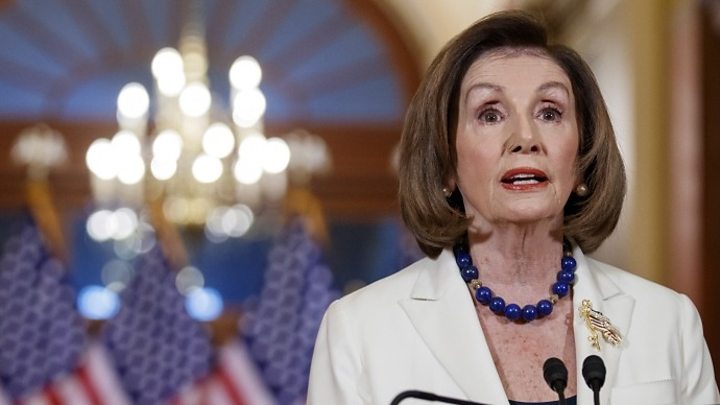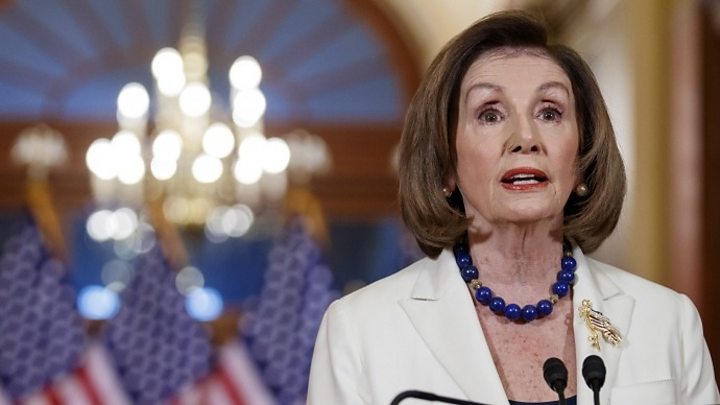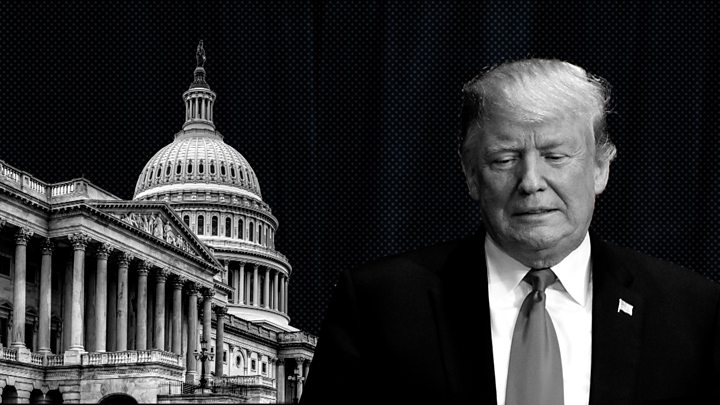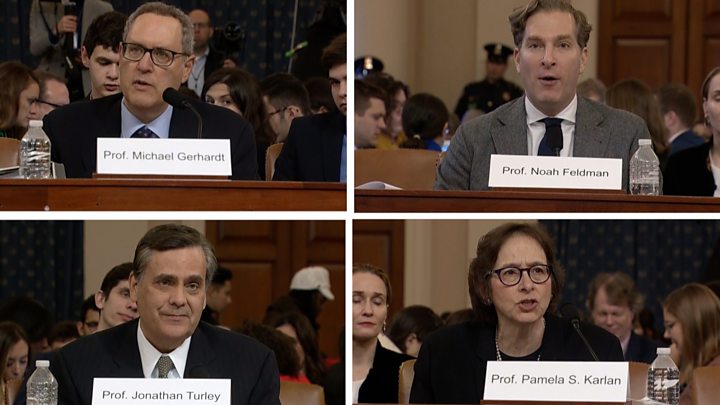Trump impeachment to go ahead – House Speaker Nancy Pelosi
“Our democracy is what is at stake,” the House Speaker says, as Mr Trump demands they act “fast”. …


Media playback is unsupported on your device
Speaker Nancy Pelosi says the House of Representatives will file impeachment charges against US President Donald Trump for alleged abuse of power.
“Our democracy is what is at stake, the president leaves us no choice but to act,” the top elected Democrat said.
She spoke a day after the House Judiciary Committee began considering potential charges against the Republican president.
Mr Trump told Democrats to move quickly if they were going to impeach him.
What did Pelosi say?
The California congresswoman told Thursday morning’s news conference: “The facts are uncontested. The president abused his power for his own political benefit at the expense of our national security, by withholding military aid and a crucial Oval Office meeting in exchange for an announcement for an investigation into his political rival.”
She added: “Sadly, but with confidence and humility, with allegiance to our founders and a heart full of love for America, today I am asking our chairmen to proceed with articles of impeachment.”
Democrats are keen to hold a vote on impeachment in the House of Representatives before the end of the year, with the prospect of a trial in the Senate perhaps as early as January 2020.
On Wednesday, Mrs Pelosi held a behind-closed-doors meeting on impeachment with her fellow Democrats and asked them: “Are you ready?”
The lawmakers responded with a rousing “Yes”, according to the Associated Press news agency.

Media playback is unsupported on your device
What did the White House say?
Mr Trump tweeted shortly before Mrs Pelosi’s remarks: “If you are going to impeach me, do it now, fast, so we can have a fair trial in the Senate, and so that our country can get back to business.”
White House press secretary Stephanie Grisham said immediately after Mrs Pelosi’s remarks that Democrats “should be ashamed”.
She added: “We look forward to a fair trial in the Senate.”
Senior Trump adviser Kellyanne Conway told reporters: “We’re ready for a trial.”
“That’s when the defence goes on the offence,” she said, adding that Republicans look forward to calling their own witnesses.
Want to find out more?
On Wednesday, three constitutional law experts testified to the House Judiciary Committee that Mr Trump’s actions to obtain help from a foreign nation amounted to an impeachable offence.
A fourth professor said Mr Trump’s actions were wrong, but not impeachable.
The Judiciary Committee is hearing from witnesses and is tasked with writing the articles of impeachment that the full House will later vote on.
Among formal impeachment charges expected to be considered by the judiciary committee are abuse of power, obstruction of justice and contempt of Congress.

Media playback is unsupported on your device
What is Trump accused of?
The impeachment process began in September after an anonymous whistleblower complained to Congress about a July phone call by Mr Trump to the president of Ukraine, in which Mr Trump appeared to tie US military assistance to Ukraine launching investigations which could help him politically.
Democrats say Mr Trump dangled two bargaining chips to Ukraine – $400m (£304m) of military aid that had already been allocated by Congress, and a White House meeting for Ukrainian President Volodymyr Zelensky – to obtain investigations. They think this alleged pressure on a vulnerable US ally constitutes an abuse of power.
The first investigation Mr Trump wanted from Ukraine was into former Vice-President Joe Biden, his main Democratic challenger, and his son Hunter. Hunter joined the board of a Ukrainian energy company when Joe Biden was US vice-president.
The second Trump demand was that Ukraine try to corroborate a conspiracy theory that Ukraine, not Russia, interfered in the last US presidential election. This theory has been widely debunked, and US intelligence agencies are unanimous in saying Moscow was behind the hacking of Democratic Party emails in 2016.
How does impeachment work?
Impeachment is the first part – the charges – of a two-stage political process by which Congress can remove a president from office.
If, following the hearings, the House of Representatives votes to pass articles of impeachment, the Senate is forced to hold a trial.
A Senate vote requires a two-thirds majority to convict and remove the president – unlikely in this case, given that Mr Trump’s party controls the chamber.
Only two US presidents in history – Bill Clinton and Andrew Johnson – have been impeached, but neither was convicted.
President Richard Nixon resigned before he could be impeached.




